
- •Южный федеральный университет о. И. Сафроненко
- •Southern Federal University
- •Предисловие
- •Contents
- •In this module you will
- •Focus on Language
- •Keep learning? Keep earning!
- •What are effective study habits?
- •In this module you will
- •Focus on Language
- •In this module you will
- •Starting Your Haunt of Treasures
- •“A university is just a group of buildings gathered around a library.” Shelby Foote
- •In this module you will
- •Unexpected Discoveries
- •Metric system microscope thermometer telescope
- •Invention /discovery
- •Breakthroughs of the 20th century
- •Verb Suffixes
- •Inventor
- •Double-edged sword
- •Learning Objectives
- •In this module you will
- •Discuss
- •Environmental Hazards of the Computer Revolution
- •Work in teams of three. Make as many words as possible using the prefixes re-, dis-, over-, sub-, en-, up- . Compare as a class.
- •The advent of “green” computer design
- •Learning Objectives
- •In this module you will
- •Science for the Twenty-First Century
- •Discuss
- •Learning Objectives
- •In this module you will:
- •Part-time Jobs vs. Holiday Jobs
- •Scripts Module 1 Unit 1
- •Module 1 Unit 2
- •Module 2 Unit 1
- •Module 2 Unit 2
- •Module 3 Unit 1
- •Module 3 Unit 2
- •Module 4 Unit 1 Abacus
- •Module 4 Unit 2
- •Module 5 Unit 1
- •Module 5 Unit 2
- •Module 6 Unit 1
- •Module 6 Unit 2
- •Module 7 Unit 1
- •Module 7 Unit 2
- •Interviewer
- •Interviewer
- •Interviewer
- •Literature
- •Grand Rosenberg The New Breed// 1995 Retrieved from http://en.Wikipedia.Org/wiki/The_New_Breed_%28episode%29
- •Part-time Jobs vs. Holiday Jobs// Retrieved from e4s:co uk http://www.E4s.Co.Uk/docs/part-time-jobs.Htm
- •Internet recourses
Focus on Language
-
Look at the entry for the word book from the English-Russian Dictionary. It will help you to work with dictionaries more effectively.
|
Pronunciation in phonetic symbols |
Part of speech


|
|
b
v Translation
a |
|||||
|---|---|---|---|---|---|---|
|
I
~
means repeat
the word
The
translation
|
|
|||||
-
Identify what parts of speech the words in bold are.
-
Pull down the blinds before you light the lamp.
-
This bright light blinds my eyes.
-
The words below have more than one meaning. Use a dictionary to find out which part of speech they are and what meanings they have. Write two sentences to illustrate different meanings of every word.
|
|
Sentence 1 |
Sentence 2 |
|
book |
I’ve bought a new book. |
Have you already booked a room at a hotel? |
|
train |
|
|
|
might |
|
|
|
last |
|
|
|
course |
|
|
|
honour |
|
|
|
subject |
|
|
|
degree |
|
|
|
way |
|
|
|
Get real |
Study the website and prospectus of your university. Then write your own advertisement for university applicants. Use the University of Birmingham text as an example. University rank
-
Levels of study
-
Fields of science
-
Accommodation provided
-
University structure
-
Location, facilities and services
-
Number of students and staff
-
Students life activities
|
Listening |
-
B

 efore
you listen,
discuss
the meaning of these words and phrases with a partner. Use
a dictionary if necessary.
efore
you listen,
discuss
the meaning of these words and phrases with a partner. Use
a dictionary if necessary.








-
Match the verbs in A with the words and phrases in B to make word combinations related to education. Translate them into your native language. Some words are used more than once.
|
A |
|
B |
|
offer |
|
|
|
suit |
|
|
|
transfer |
|
a course |
|
cover |
|
a qualification |
|
specify |
|
credit points |
|
gain |
|
one’s interest |
|
design |
|
progress |
|
take |
|
a route of study |
|
provide |
|
an opportunity |
|
develop |
|
skills |
|
pass |
|
modules/subjects |
|
broaden |
|
|
|
monitor |
|
|
-
Listen to James Couzin, Education Consultant at “Universities UK” speaking on the new modular schemes. Complete the notes.
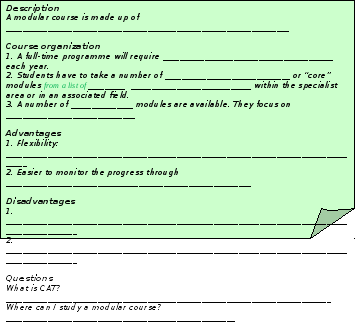
(Adapted from The HERO.ac.uk site)
|
Reading |
Read the interview by Helen Joyce from Plus Magazine with Emily Dixon, a third-
year mathematics student at Oxford and answer the questions below.
Emily, how did you choose to take the course of maths?
When it came to choosing A Levels I wasn't quite sure which route I wanted to take. I knew I definitely wanted to do maths, just because it was a subject I was good at, and it interested me more than most subjects. My teacher was very good at encouraging me to go beyond the scope of the syllabus and we went to lectures in London and at the University of Cambridge. So I knew I only got a very small glimpse of what maths was about at school. It changes dramatically when you get to university.
So, it was easy for you to choose a university, wasn’t it?
Well, as I had high grades, I was advised to consider Oxford or Cambridge. But I had lived in Cambridge all my life, so I wanted a change and I didn't want my parents checking up on me every five seconds! That’s why I considered various universities, but in the end I set my sights on Oxford, choosing to apply to St John's College.
Did you have to do exams?
Yes, I needed to achieve three A grades out of four, two of which had to be in maths and further maths. I also went for an interview at the college.
So you were offered place and started the college.
Yeap, I found my first term at university something of a shock to the system.
What do you mean?
A level maths was the sort of maths I could do; it didn't take too much hard work. And some lecture courses start where A level left off. But you do what took you two weeks at A level in one lecture maybe, or even less. Suddenly I had to come to terms with the concept of lectures and structuring my own work schedule and doing my tutorial! The first time I was thinking: 'I haven't done everything right. I don't know what to do, the tutor's going to kill me!' But they're there to help you through it. There are some people who can just look at a problem sheet and do it. I am not one of those people! But with enough work, it generally makes sense.
How long are you going to study?
For four years.
But, you don't have to do a fourth year. Three will give you a B.A.
Right. However, the fourth year gives you M.Math. For the three-year course you have to do a paper in something outside maths and for the four-year you really just do maths.
Well, have you decided on your future career yet?
I’m still undecided. There are so many things you can do with maths –but definitely not a research mathematician. I don't think I'm good enough. I think a Masters degree is as far as my maths is capable of taking me.
(Adapted and abridged from http://plus.maths.org/issue28/interview/index.html
-
What reasons did Emily have for choosing Oxford University?
-
Why did she decide on the course in mathematics?
-
How long is the course?
-
How do studies at college differ from studies at school?
-
What qualification will she get?
-
What is Emily planning to do in future?
|
Writing |
-
Application forms mostly ask for information rather than ask questions. Match a line in A with a question in B.
|
A |
B |
|
|
|
|
|
|
|
|
|
|
|
|
|
|
|
|
|
|
-
Fill in the application form for admission. Write in block capitals. Put N/A if the information is not applicable.

|
Application Form for admission as an undegraduate student
1. Personal information Title__________________________________________________________Mr/Mrs/Miss Surname__________________________________________________________________ First Name(s)______________________________________________________________ Date of birth (use figures only): date__________ month_____________ year___________ Place of birth____________________________Citizenship_________________________ Home address: street and house_______________________________________________ city____________________country______________________postcode______________ Telephone (country, area code/phone number)____________________________________ Email____________________________________________________________________ Mailing address (if different from home address)__________________________________ _________________________________________________________________________
3. Prefered field of study
4. University entrance qualifications: Type (gymnasia, lyceum, comprehensive school, vocational school, technical school)____ _________________________________________________________________________ Date of completion_________________________________________________________ Average grade (not necessary for foreign certificates)______________________________
5. Professional training/practical training (please include references) Professional qualification ____________________________________________________ Duration of training from_______________________until__________________________
6. Professional experience after training and/or other working experience (for more than 8 weeks, include references)
7. University/college previously attended (if you have previously been registered as a full-time student at a university/college, please supply all information) Institution________________________________________________________________ Qualifications completed/being studied_________________________________________ Field of study _____________________________________________________________ Dates____________________________________________________________________
Date _____________________ Signature _________________________
|
|
Role play |
|
Study help Make use of every opportunity you get to practice speaking in class. Role-plays help you prepare for a real-world experience. |
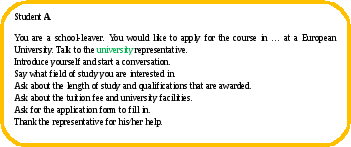
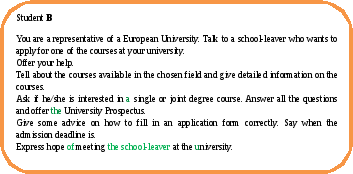
|
In the Realm of Science |
-
In education, as well as in many other spheres of our life, there are a great number of abbreviations. Read and remember the abbreviations to do with the degree titles, e.g. BS stands for Bachelor of Science. Do all of them have Russian equivalents?
|
A.S. |
Associate of Science (USA) |
|
A.A. |
Associate of Arts (USA) |
|
A.A.S. |
Associate of Applied Science (USA) |
|
BS |
Bachelor of Science |
|
BA |
Bachelor of Arts |
|
MS |
Master of Science |
|
MA |
Master of Arts |
|
M.Math* |
Master of Mathematics |
|
M.Eng.* |
Master of Engineering |
|
MPhil* |
Master of Philosophy (UK) |
|
MBA |
Master of Business Administration |
|
PhD |
Doctor of Philosophy |
|
Hons3 |
Honours |
|
HND |
Higher National Diploma (UK) |
|
HNС |
Higher National Certificate (UK) |
|
FdA |
Foundations degree in Arts |
|
FdSc |
Foundations degree in Sciences |
M.Math – professional (taught) degree
M.Eng. – research degree
MPhil - a university course that is of a higher level than a basic course
What degrees are awarded in Russian universities?
-
Read and remember some of the terms describing academic positions.
|
a teacher |
- |
someone who teaches, especially someome whose job is teaching, especially in a school |
|
a tutor |
- |
(BrE) someone who gives lessons to an individual student or a very small group (NAmE) an assistant lecturer in a college |
|
a lecturer |
- |
(especially in Britain) someone who teaches at a university or college |
|
a professor |
- |
(especially BrE) a university teacher of the highest rank |
|
a full professor |
- |
(NAmE) a rank of university teacher, and not as a title |
|
an associate professor |
- |
(in the US and Canada) a teacher at a college or university who has a rank just below the rank of a professor |
|
an assistant professor |
- |
(in the US and Canada) a teacher at a college or university who has a rank just below the rank of an associate professor |
|
staff |
- |
all the workers employed in an organization considered as a group (BrE) teaching staff Ç (BrE) (NAmE) the people who work at a school, college or university, but who do not teach students |
|
faculty |
- |
(NAmE) all the teachers of a particular university or college |
|
a visiting professor |
- |
someone who has a job at one school but works at another for a period of time. |
|
an adjunct professor |
- |
someone who is on a part-time position, to do research or teach classes. |
|
professor Emeritus |
- |
someone with a title showing that the person, usually a university teacher, keeps the title as an honour, although he or she has stopped working |
|
an instructor |
- |
someone who teaches sb a practical skill or sport; (NAmE) a teacher below the rank of assistant professor at a college or university |
|
a coach |
- |
someone who trains a person or team in sport, and helps them to improve their skills |
|
a trainer |
- |
someone who trains people in the skills they need to do a job |
|
an educator |
- |
someone who teaches in a school, college, or university and who is an expert in the theories and methods of education |
(Longman Language Activator)
|
Unit 1. Progress Monitoring In this unit you have worked on the vocabulary related to the topic “Higher education”
Tick (V) the points you are confident about and cross (X) the ones you need to revise. |
|
Unit 2 There is So Much to Study in Science |
||
|
|
Lead in |
|
-
Look at the diagram of the natural sciences and their terms. Work in teams and add four more terms of your own that go with the particular science.
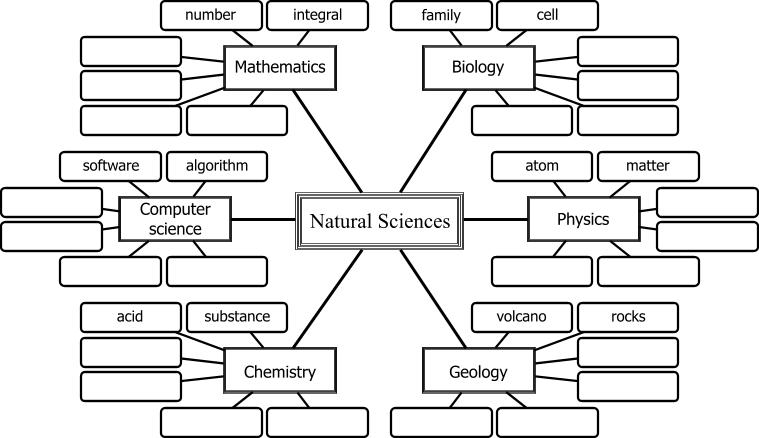
-
Look at the definition of biochemistry below. Work with a partner. Give a definition of your field of study using the verbs from the Functional language box.
Example: Biochemistry examines the structure and function of living organisms
at the molecular level.
-
Functional language: Giving definitions
… is a science / study of …
… studies/examines/investigates/etc. …
… describes/deals with/determines/etc. …
… uses/analyses/focuses on/etc. …
|
Reading |
1. Look through the definitions of some natural sciences dealing with environmental issues. Match the definitions with the right titles of sciences below. Mark the key words in each definition that helped you to make the right guesses. A is done as an example.
|
Study help Choosing techniques appropriate for your reading goals can save you time. Here are some reading techniques you may find helpful for reading efficiently—quickly and with good understanding.
|
A …is concerned with the health of our environment and the significance of pollution. It focuses around our ability to improve our understanding of the effects of pollution on plants and animals and to develop early warning markers of organisms, population or environmental health.
B …uses a high level of mathematical technique for the description and analysis of complex environmental systems. It needs complicated statistical methods in the design of experiments and interpretation of measurements in the monitoring of the environment…
C …uses scientific background to the processes which affect the environment and its management as well as considering the social, legal and policy implications of environmental issues.
D …is the scientific study of chemical and biochemical phenomena that occur in natural places. It deals with the behaviour of both natural and man-made substances in relation to atmospheric, aquatic and terrestrial environment.
E …is the science of the relationship between organisms and their environments. It is the study of harmful effects of modern civilization on the environment, with a view toward prevention or reversal through conservation.
(Adapted from Lancaster University Undergraduate Prospectus Entry 2005)
|
|
|
|
|
|
|
Writing |
|
Write the definition of your field of study. Pay attention to the key words you use.
|
Listening |
-
Work with a partner. Choose the correct explanation of the words and phrases below. Use a dictionary if necessary.
1. If something is hands-on it is
a) theoretical b) practical c) both
2. If something is promising it
a) is bad and useless b) is unknown c) shows potential
3. If something captivated you it was
a) dead boring b) fascinating and attractive c) absolutely new to you
4 If something is familiar to you it is
a) well-known b) strange c) clear
5. If it is a procedure of something it is
a) a process or method b) a rule c) an explanation
6. If you hesitate you feel
a) brave b) unhappy c) uncertain
7. If you have a doubt about something you
a) feel scared b) hesitate c) feel angry
8. If you decide to broaden your knowledge of a subject you
a) forget about it b) think about it a lot c) learn more about it
9. If you are inquisitive you
a) are talented b) are imaginative c) want to know
more about people or things
2. Listen to John, Paul and July telling how they got interested in science. Tick (V) the correct piece of information about them.
|
Who…? |
John |
Paul |
July |
|
|
|
|
|
|
|
|
|
|
|
|
|
|
|
|
|
|
|
|
|
|
|
|
|
|
|
|
3. Listen again and answer the questions.
-
Are they all happy with their choice of specialization?
-
Why can interest in science mean a future full of choices?
-
What are the possible disadvantages of being a research scientist?
|
Speaking |
Work with a partner, ask each other the questions below.
-
Are you happy with the choice of your subject area? Why?/Why not?
-
How did you get interested in it?
-
What are your plans for the future? Do you have any particular career in mind?
-
Would you like to become a research scientist? Why?/Why not?
-
What else except for an inquisitive mind one should have to be a research scientist?
-
Do you agree that successful scientists are born rather than made? Why?/Why not?
|
Writing |
|
Write a paragraph about your partner’s choice of the subject area using his/her answers to the questions above and the information in the Study help box as the guidelines to help you to organize your ideas and develop a good piece of writing.
-
Study help
-
A paragraph is a group of related sentences that develop an idea.
-
In a paragraph there is usually one idea that is more important than all the others and it is commonly found at the beginning.
-
The main idea is supported by major details that grow out of it. And there are also minor details that grow out of the major ones, i.e. examples, explanations, additional information, etc.
-
When you write, try to join your ideas with the linking words and phrases, e.g. first of all, moreover, besides, finally, actually, in any case.
-
When you have finished, re-read and check your work.
-
|
Reading |
-
You are going to read the text about the Combined Science (Natural Sciences) course. Work with a partner and make a list of subjects that you think are included in the curriculum.
-
Read the description of the Combined Science degree course offered in Lancaster University in the UK and check the predictions you have made.
Guess the meaning of the highlighted words. Check as a class.
The
Combined Science degree, which includes Natural Sciences, is
founded on Lancaster's tradition of flexibility
and forward thinking. Following current
interest in a broader, less specialized education we have brought
together 25 departments offering 56 different courses from which
you can take a degree adapted to your personal requirements. The
scheme cuts through the conventional
barriers between subjects, allowing combinations not only between
the sciences, but also between the sciences
and
the humanities or social sciences.
Most
science degrees require a specialized study of a single subject
even though the majority of science graduates eventually follow
careers which would be better served by a broader, less specialized
education providing relevant
experience in, for example, management, languages or social
sciences.

(Adapted from Lancaster University Undergraduate Prospectus Entry 2005)
-
Read the text again and answer the questions.
-
How many departments are involved in training students in the Combined
Science course?
-
Who may find this course most attractive?
-
Does the combined course provide any particular career opportunities? What are they?
-
How many natural science subjects can a student take?
-
Who can help students to make the right choice of the subjects?
-
Match each item on the left with anStudy help
We remember new words much more easily if we think about them in relation to our own experience and if they have some personal meaning for us.
item on the right to make a phrase commonly used in English. Use prepositions where necessary.
-
specialized
current
wide
personal
barriers
a wide range
programme
provide
academic
forward
mature
of
between
study
requirements
subjects
excellence
choice
education
student
thinking
interest
a means of
areas
Focus on Language
-
Read the sentences below and study the models in the box. Translate them into your native language.
-
About one-third of the first year is based on course work.
-
A number of our graduates have taken up PhD studies.
-
Subject and verb agreement
-
Singular expression (a lot of)+plural noun/pronoun+ plural verb
-
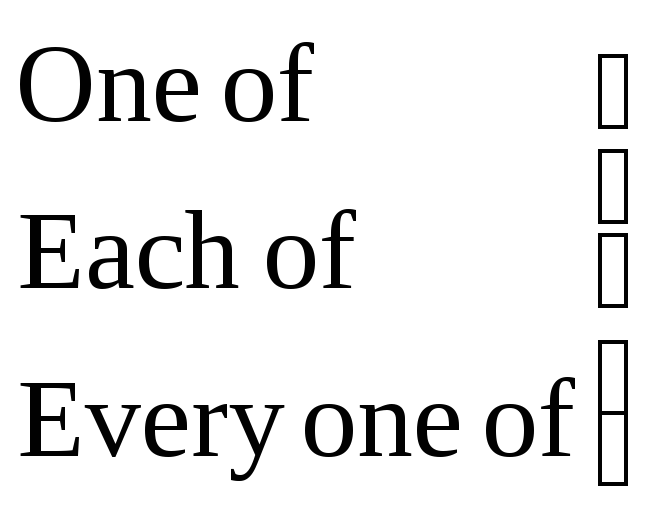 +
plural noun + singular verb
+
plural noun + singular verb -
Some of + singular noun+ singular verb
-
Some of + plural noun+ plural verb
-
Plural expressions:
 + singular
verb
+ singular
verb
6) a number of + plural noun + plural verb
7) the number of + plural noun + singular verb
-
-
Choose the correct verb in brackets.
-
Surveys show that the majority of school-leavers (consider/considers) a
university degree a good starting point for their future career.
-
Each of the students (has/have) a notebook.
-
Of our recent graduates about half (is/are) continuing their studies for a higher degree.
-
Why (was/were) some of the students absent from classes?
-
My teenage brother thinks there (is/are) a number of good reasons for staying up late and having a good time.
-
More than one computer in this lab (has/have) broken down.
-
Statistics (is/are) a branch of mathematics.
|
Speaking |
Work in groups. Use the scheme of the degree course in Combined Science offered in Lancaster University as a model. Discuss it and design a modular degree course that suits your particular needs and interests.
|
Get Real |
Visit a website of any European or American university to learn more about modular courses in your subject area. How would you structure a degree course in Combined Science? Prepare a short talk.
-
Study help
Preparing and giving a short talk
-
Find some information on the topic you are going to talk about
-
Check that the information is all correct
-
Make notes on the subject of your talk and organize the information
-
Have a strong opening and close
-
Make it interesting
-
Keep your sentences short and simple
-
Make sure you pause in the right places
-
Speak for your audience, not for yourself
-
Do not read! It’s really boring.
-
Point to the relevant parts of the visual as you speak
-
Say Thank you and welcome questions from your audience
-
Handle questions positively
-
|
Writing |
|
-
Write two or three paragraphs of about 150 words to describe a Modular Course in Combined Science you would like to take. Use the guidelines to organize your ideas.
-
describe the course you would like to take
-
give reasons for your choice
-
specify the advantages of the course for your future career
-
In pairs exchange and check the paragraphs you have written. Which science is most popular with your academic group?
|
In the Realm of Science |
-
Read the expressions for fractions, decimals and percentages.
![]()
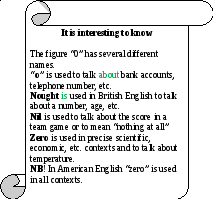 one
half, a half
one
half, a half
![]() one
third
one
third
![]() two
thirds
two
thirds
![]() four
sevenths
four
sevenths
3![]() three
and a quarter
three
and a quarter
0.2 nought point two
(zero) point two
0.75 nought point seven five
25.34 twenty-five point three four
1% one percent
78% seventy eight percent
90% ninety percent
-
Read aloud the following numbers.
13 30 307 69 145 90 850 615 1,520 5,000 100,000 5,000,000
When do we say and?
-
Practise the following dates:
|
1995 |
nineteen ninety-five |
|
|
2000 |
(the year) two thousand |
|
|
2007 |
(BrE) two thousand and seven (twenty hundred and seven) (NAmE) two thousand seven |
|
|
2025 |
twenty twenty-five |
|
|
Use ordinal numbers for dates |
||
|
15th December 2010 December 5th, 2010 |
(BrE) the fifth of May 2010 or 15/12/10 (NAmE) May the fifth 2010 or 12/15/10 |
|
How do you say these dates?
December 12, 1987 26th August 2001 11/23/11 (USA)
9th February 1900 31st September 2000 June 14, 1846 March 3, 1966 11/09/06 (UK) 01/01/01
-
There are different ways of saying the time.
Words past (or in American English after) and to (or in American English of) are used in spoken English:
|
7:05 |
- |
five past seven |
7:15 |
- |
quarter past seven |
|
7:30 |
- |
half past seven |
7:45 |
- |
quarter to eight |
|
7:55 |
- |
five to eight |
8:00 |
- |
eight o’clock |
Sometimes you can use the figures in order you see them:
|
7:05 |
- |
seven oh five |
7:15 |
- |
seven fifteen |
|
7:30 |
- |
seven thirty |
7:45 |
- |
seven forty-five |
|
7:55 |
- |
seven fifty-five |
8:00 |
- |
eight a.m./p.m. |
To talk about travel timetables the 24-hour clock is used:
|
19:15 |
- |
nineteen fifteen |
22:35 |
- |
twenty-two thirty-five |
How do you say the time?
14:45 8:15 23:10 12:30 18:55 21:00
|
Unit 2. Progress Monitoring In this unit you have worked on the vocabulary related to the topic “Higher education”:
Tick (V) the words and phrases you are confident about and cross (X) the ones you need to revise. |
|
Unit 3 Review |
-
Complete the sentences with your own words. Use only present tenses. Pay attention to the subject-verb agreement.
-
One of my teachers …
-
A great number of first-year students …
-
A lot of universities …
-
Each of the students …
-
The number of books on this subject …
-
The United Arabic Emirates …
-
Some of the information …
-
Mathematics …
-
Explain the similarity and difference between these expressions.
compulsory subject - optional subject
undergraduate course - graduate course
sciences - humanities
-
Spot the odd word out.
|
|
lecture |
tutorial |
laboratory work |
subject |
|
|
compulsory |
elective |
undergraduate |
optional |
|
|
essay |
assessment |
coursework |
examination |
-
Complete the definitions of sciences below with the key words from the box.
|
|
|
|
|
|
|
|
|
|
|
|
|
|
|
|
|
|
|
|
|
|
|
|
|
|
|
|
|
|
|
|
-
Physics is the natural science which examines basic concepts such as ………….., charge, ……………… and its motion and all that derives from these, such as ………………, ……………., and space-time.
-
Chemistry is the science concerned with the composition, ……………………… , and ………………………….. of matter and substances, how they ………………….. when combined or in contact with one another, and how they behave under different ……………………………….. .
-
Biology is the science that studies ……………………………………, their structure, ……………………, growth, ………………….., ………………………., distribution and classification.
-
Geography is the study of the …………………….. and its lands, ……………………………………., divisions and phenomena, ………………………………….. and products.
-
Geology deals with the solid and ……………………… matter that constitutes the Earth. It studies composition, ………………………….., physical properties, …………………………….., and …………………… of Earth materials, and the processes by which they are formed, moved, and changed.
-
Mathematics is the study of …………………………, structure, ……………………, change, and related topics of ………………………………. and form. It formulates new assumptions and establish their truth by rigorous deduction from appropriately chosen …………………… and definitions.
-
Mechanics is concerned with the ……………………………… of physical bodies when subjected to forces or………………………….., and the subsequent ……………… of the bodies on their environment.
-
Engineering is an activity of …………………….. scientific knowledge and ………………………natural laws and physical resources in order to design and ……………………. materials, structures, …………………….., devices, ………………………., and processes, that safely ……………………..a desired objective.
-
Read these sayings. Choose one or two that you agree or disagree with and discuss them with a partner.
-
“Genius without education is like silver in the mine.” Benjamin Franklin
-
“The roots of education are bitter, but the fruit is sweet.” Aristotle
-
“Education is what remains when we have forgotten all that we have been taught.” George Savile, Marquis of Halifax
-
Match the numbers on the left with the correct description on the right.
-
-
0.25
-
a telephone number
-
1205 886 4539
-
a fraction
-
89%
-
a date
-
23/4/2006
-
a percentage
-
£95.99
-
a decimal
-
¼
-
a price
-
-
The times below are written in three different ways. Match the times which are the same.
|
A |
B |
C |
|
Eleven thirty-five |
4:30 |
Five to midnight |
|
Three forty-five |
23:35 |
Twenty-five to twelve |
|
Three twenty |
12:25 |
Twenty past three |
|
Four thirty |
3:45 |
Half past four |
|
Eleven fifty-five |
11:35 |
Quarter past four |
|
Four fifteen |
16:15 |
Quarter to four |
|
………………….. |
15:20 |
……………………… |
|
Role play |

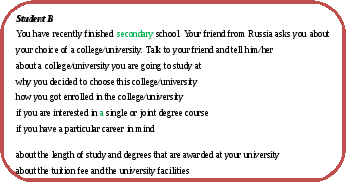
|
Each one teach one |
Write down a short vocabulary list (ten items) on the topic “Higher education”.
Work with a partner and compare your lists. Cross out the items you both have on your lists. Explain the meaning of the rest of the words and phrases.


“Information cannot replace education”
Earl Kiole
Learning Objectives

 ook
[ buk
] n.
1. книга; 2. литературное произведение;
ook
[ buk
] n.
1. книга; 2. литературное произведение;


 dj.
книжный, ~ learning
– теоретические знания
dj.
книжный, ~ learning
– теоретические знания